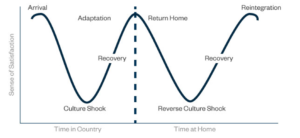Psychology student Kaylee Low shares her experiences of returning home after studying in the UK and offers some insightful and practical solutions to dealing with reverse culture shock.
Home has changed, and so have I. The shock hit me when I travelled from Bath to my home country, Malaysia. It was totally uncalled for…
Let’s backtrack to when I finished my first year of university, getting ready to spend my summer holiday back home. I again found myself all excited and emotional on the plane, just like when I first left home to study abroad. I could not calm myself down, knowing that I’d soon be surrounded by family, friends, and everything I knew.
It wasn’t long after I realised that I was completely wrong. The whole “coming home” experience was anticlimactic — the same foreign feeling when I first arrived in the UK rushed through my veins. Except for this time, I felt detached at a place I once called “home”. I experienced what is known as a reverse culture shock, and the process very much follows this curve:

Here’s how reverse culture shock manifested in me:
Having tasted the sweet life of freedom, coming home to an at best, tight-knit, or an at worst, enmeshed family was difficult. I long for the liberty of going out without having to report my whereabouts. I too long for the community I’ve built back in university and despise the fact that I’ve outgrown my friends here at home. I felt isolated.
I was engulfed in a toxic loop of comparison that I couldn’t break free from. I found myself constantly comparing my life at home versus my life in Bath. One of the differences that I’d noticed is the social etiquette between both countries. In England, people take pride in being courteous – words like “thank you” and “please” goes without saying. In Malaysia, however, being on time is not a thing! Whenever I arrange an activity with my friends or family, I must double-check if we’re actually meeting at 8 pm or 8 pm “Malaysian time”. The worst part is that I’ve known the punctuality culture here for a long time; it’s no different today from how it was a year ago, yet it felt so out of place.
Coming home and realising it’s not what I’d imagined it would be is baffling enough as is. Unable to express that feeling without coming off as some preachy person who has lived abroad and came home wiser is even worse. There’s also this expectation from others to be the person I once was. Often, I turn into a hermit to be my real self in private; the person I like to be now.
It was challenging, and I’m not going to downplay the whole experience. But as a person who has been through it all, I’m confident in telling you that it does get better. One sentence that gave me a silver lining to readjusting at home: if you could travel to another corner of the Earth and adapt to the culture, what’s stopping you from readapting to your own?
Here’s what’s done and tested:
Manage your expectations
I found it helpful to scrap all of the expectations I had from coming home and start building it all from ground zero. Treating every experience as a new normal is a good coping strategy. Understand this: the more resistant you are to change, the harder the transition back.
Be obsessed with the good things
Our brain is hardwired to fixate on the bad part when we’re in a bad state. That’s our negativity bias. I actively tried to immerse myself in the things I enjoy when I couldn’t abroad: family time, Malaysian food, having conversations in English with injection of Malay and Chinese words, and jogging in an actual puddle of sweat.
Be a tourist in your hometown
There’s no reason not to look for an adventure close to home. I probably had visited more places than I had before I went abroad. Having seen so many new spots in Malaysia, it feels refreshing to be home, but again I doubt myself; why do I even leave this beautiful place?


Our cave and waterfall in Malaysia – of course it’s going to be difficult to say goodbye to this!
Get plugged in
Find a community that you love, even if that means introducing yourself to new people, like the effort you put in during Freshers Week. One of the main symptoms of reverse culture shock is loneliness and isolation. Being around people who enjoy the same things as you do helps. I started hiking again when I went home, which brought me to a community of hikers, hence the adventures! If you’re lucky, you could even find others who are in the same shoes as you who could understand what you’re going through.
All in good time
One thing to keep in mind is that shock takes time to fade. So be patient with the people around you as you slowly show them who you are now; “expectation shock” can be mutual too! It took me two good months to move on, and I am still finding my new normal.
Respond


